Using the SimpleWebAuthn TypeScript package, I have generated a ECDSA-SHA256 key pair and I used the key pair to sign a challenge. The SimpleWebAuthn package uses crypto.webcrypto.subtle (see this line) to verify the signature. I want to verify the signature in ethers.js as a proof of concept so I can verify the WebAuthn signature in my Ethereum smart contract using ecrecover. Below is a code snippet of what I am doing currently
import crypto from 'crypto';
import base64url from 'base64url';
import { ethers } from 'ethers';
import { AuthenticationCredentialJSON } from '@simplewebauthn/typescript-types';
import { ECDSASigValue } from '@peculiar/asn1-ecc';
import { AsnParser } from '@peculiar/asn1-schema';
// Helper functions from @simplewebauthn/server
function shouldRemoveLeadingZero(bytes: Uint8Array): boolean {
return bytes[0] === 0x0 && (bytes[1] & (1 << 7)) !== 0;
}
function fromUTF8String(utf8String: string): Uint8Array {
const encoder = new globalThis.TextEncoder();
return encoder.encode(utf8String);
}
async function digest(data: Uint8Array, _algorithm: number): Promise<Uint8Array> {
const hashed = await crypto.webcrypto.subtle.digest('SHA-256', data);
return new Uint8Array(hashed);
}
async function toHash(data: Uint8Array | string, algorithm = -7): Promise<Uint8Array> {
if (typeof data === 'string') {
data = fromUTF8String(data);
}
return digest(data, algorithm);
}
function concat(arrays: Uint8Array[]): Uint8Array {
let pointer = 0;
const totalLength = arrays.reduce((prev, curr) => prev + curr.length, 0);
const toReturn = new Uint8Array(totalLength);
arrays.forEach((arr) => {
toReturn.set(arr, pointer);
pointer += arr.length;
});
return toReturn;
}
async function verifyAuthentication(authJson: AuthenticationCredentialJSON) {
// 1. Creates the digest WebAuthn signs, see https://github.com/MasterKale/SimpleWebAuthn/blob/6f363aa53a69cf8c1ea69664924c1e9f8e19dc4e/packages/server/src/authentication/verifyAuthenticationResponse.ts#L189
const authDataBuffer = base64url.toBuffer(authJson.response.authenticatorData);
const clientDataHash = await toHash(base64url.toBuffer(authJson.response.clientDataJSON));
const signatureBase = concat([authDataBuffer, clientDataHash]);
// 2. Retrieving the r and s values, see https://github.com/MasterKale/SimpleWebAuthn/blob/6f363aa53a69cf8c1ea69664924c1e9f8e19dc4e/packages/server/src/helpers/iso/isoCrypto/verifyEC2.ts#L103
const parsedSignature = AsnParser.parse(
base64url.toBuffer(authJson.response.signature),
ECDSASigValue,
);
let rBytes = new Uint8Array(parsedSignature.r);
let sBytes = new Uint8Array(parsedSignature.s);
if (shouldRemoveLeadingZero(rBytes)) {
rBytes = rBytes.slice(1);
}
if (shouldRemoveLeadingZero(sBytes)) {
sBytes = sBytes.slice(1);
}
// 3. Recover the Ethereum address from the digest and the signature
const finalSignature = ethers.utils.concat([rBytes, sBytes]);
return ethers.utils.recoverAddress(signatureBase, finalSignature)
}
// 4. authJson is the result from the startAuthentication method
const authJson = {
id: 'tS94WWAhrxcCg0tKfStI7wCgL14rAzqlHX5qaNbE8jw',
rawId: 'tS94WWAhrxcCg0tKfStI7wCgL14rAzqlHX5qaNbE8jw',
response: {
authenticatorData: 'SZYN5YgOjGh0NBcPZHZgW4_krrmihjLHmVzzuoMdl2MFAAAAAA',
clientDataJSON: 'eyJ0eXBlIjoid2ViYXV0aG4uZ2V0IiwiY2hhbGxlbmdlIjoiZDlmMjlhNGUzNDdhZDg5ZGM3MDQ5MDEyNGVlNjk3NWZiYzA2OTNjN2U3MmQ2YmMzODM2NzNiZmQwZTg4NDFmMiIsIm9yaWdpbiI6Imh0dHA6Ly9sb2NhbGhvc3Q6MzAwMCIsImNyb3NzT3JpZ2luIjpmYWxzZX0',
signature: 'MEUCIDfTCO7Eei5iOC4exyEL65yFrr_ZWZCLz6n3BVeGWt8uAiEAkHyTMXDESHWzW7XKpq1l4eF2KkmDbt1-55CAXpQ3AkE',
userHandle: '7e5ba61e-6f42-4351-93a1-f7b057551df7'
},
type: 'public-key',
clientExtensionResults: {},
authenticatorAttachment: 'platform'
}
verifyAuthentication(authJson)
Sometimes the ethers.utils.recoverAddress would run successfully but the public address it was able to recover was different every time. Sometimes the ethers.utils.recoverAddress would throw this error
Error: invalid point
at ShortCurve.pointFromX (/Users/alex/programming/projects/playground/api/node_modules/elliptic/lib/elliptic/curve/short.js:195:11)
at EC.recoverPubKey (/Users/alex/programming/projects/playground/api/node_modules/elliptic/lib/elliptic/ec/index.js:215:20)
at recoverPublicKey (/Users/alex/programming/projects/playground/api/node_modules/@ethersproject/signing-key/src.ts/index.ts:82:30)
at Object.recoverAddress (/Users/alex/programming/projects/playground/api/node_modules/@ethersproject/transactions/src.ts/index.ts:115:43)
at WebAuthnApiService.verifyAuthentication (/Users/alex/programming/projects/playground/api/src/services/webauthn/webauthn.service.ts:343:20)
at target (/Users/alex/programming/projects/playground/api/node_modules/@nestjs/core/helpers/external-context-creator.js:77:28)
at Object.verifyAuthentication (/Users/alex/programming/projects/playground/api/node_modules/@nestjs/core/helpers/external-proxy.js:9:24)
ethers.js handles keys with secp256k curve but the WebAuthn keypair belongs to the P-256 curve, so this might be why it throws the invalid point error, but I don't understand why that happens only some of the times. I can't do much here because the only kinds of ECDSA keypair my device supports belongs to the P-256 curve
Another area of problem might be the message hash format, usually we keccak256 the message value before we sign the data using ethers.js, but WebAuthn doesn't seem to do that so we are not able to recover the public address reliably.
Note: I am using an up-to-date version of ethers.js (v5.5.1)
